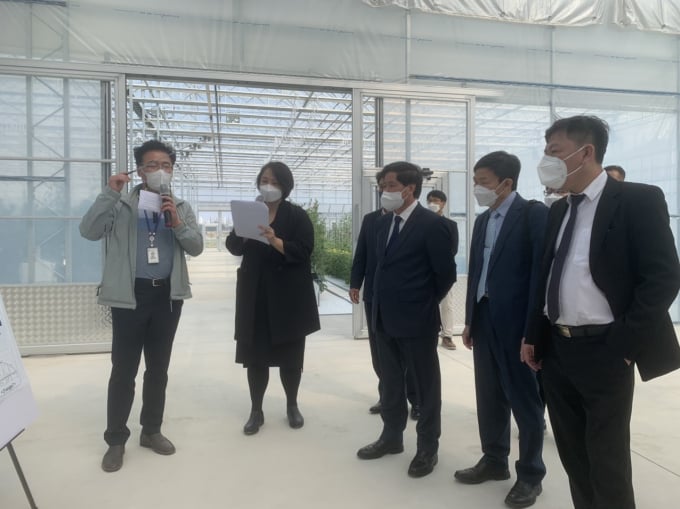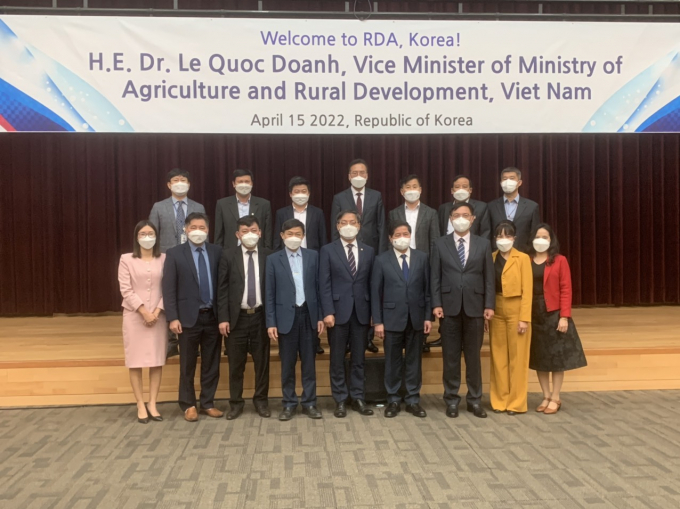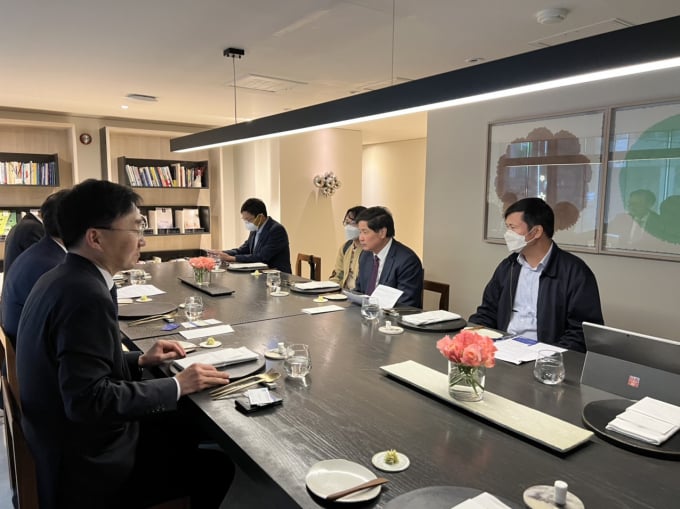November 26, 2025 | 16:54 GMT +7
November 26, 2025 | 16:54 GMT +7
Hotline: 0913.378.918
November 26, 2025 | 16:54 GMT +7
Hotline: 0913.378.918
On April 13-16, 2022, during a working visit to South Korea, the MARD delegation led by Deputy Minister Le Quoc Doanh met with the Rural Development Administration of South Korea (RDA) and the Korea Rural Community Corporation under the Ministry of Agriculture, Food, and Rural Affairs.

Deputy Minister Le Quoc Doanh (3rd from the right) visits a smart farm model in South Korea. Photo: Anh Tuan.
At the meeting, RDA Director Park Byung Hong emphasized that while the two countries bilateral relations have progressed significantly since the establishment of diplomatic relations in 1992, agricultural ties have been developed and strengthened since 2009, when RDA signed a Memorandum of Understanding with the Vietnam Academy of Agriculture Sciences and established the Korea Program for International Cooperation in Agricultural Technology (KOPIA). This event provided the groundwork for the two countries' successful agricultural collaboration over the next decade.
Vietnam is the first country chosen by South Korea to implement a strategy designed to aid developing countries in increasing the efficiency of agricultural production. KOPIA and Vietnam are collaborating on the following projects: technology transfer for biofuel crops, high-grade vegetable varieties, edible and medicinal mushroom production, safe food production, development of temperate fruit trees, agricultural extension development, and industry 4.0 application in agriculture. The initiative will get a total of more than USD 4 million in financing.
According to RDA Director Park Byung Hong, Vietnam and South Korea possess distinct potential and strengths for agricultural cooperation. Not only are agricultural cooperation projects between Vietnam and South Korea aimed at increasing the transfer of biotechnology and plant varieties, but they also have a larger purpose of building smart and sustainable agriculture.
Several initiatives have been performed over the last several years under the auspices of KOPIA and the Asian Food and Agriculture Cooperation Initiative (AFACI), bringing positive effects and increasing output.

The delegation of the Ministry of Agriculture and Rural Development took photos with the representatives of Rural Development Administration of South Korea (RDA). Photo: Anh Tuan.
Deputy Minister Le Quoc Doanh also worked with the KRC corporation during this visit. This is a functional unit responsible for the research, development, execution, and administration of the South Korean government's official development assistance (ODA) projects in agricultural and rural development in Vietnam.
KRC has already conducted several non-refundable ODA projects to assist Vietnam's agriculture economy. Additionally, The representative of KRC also expressed his belief that 2022 will be an important year, marking the strategic cooperative partnership between Vietnam and Korea. It is a very meaningful year for Korea and Vietnam as they look forward to the 30th anniversary of the establishment of diplomatic relations together.
KRC will place a premium on rural development, sustainable agriculture, and disaster preparedness. The Korean side is dedicated to collaborating with Vietnam in the next years to concretize cooperation and strategies.
Deputy Minister Le Quoc Doanh expressed gratitude to the Korean Government and affiliated agencies, particularly RDA and KRC, for their collaboration and practical help on various projects on behalf of the Ministry of Agriculture and Rural Development's leaders.
KOPIA's technical cooperation projects have had a significant impact on Vietnam's agricultural sector in the past, assisting Vietnam in gaining expertise in policy procedures, rural development, and particularly high-tech agricultural production models.
Simultaneously, KRC's cooperation projects in Vietnam have aided in the development of rural regions in the country; the projects fit with the industry's growth strategy and encourage sustainable agriculture development.
Among which, sustainable potato development projects associated with processing, the construction of a cold storage system to preserve agricultural products, and a project to improve the rice value chain in the Red River Delta... are expected to be equipped with infrastructure and equipment for production, processing, and preservation, thereby increasing rice farmers' income and improving farming and processing capacity and economic efficiency, thereby contributing to increasing income for rice farmers.

Deputy Minister Le Quoc Doanh worked with the Korea Rural Development Corporation. Photo: Anh Tuan.
Deputy Minister Le Quoc Doanh stressed that South Korea's economic and agricultural-rural development models are very comparable to those of Vietnam. Vietnam is now undertaking agricultural restructuring to enhance added value, support market-based growth, and establish new countryside. These are also two areas in which Korea is ahead of the trend and has extensive expertise. The "New Village" concept (Seamaul undong), introduced in the 1970s, has been a tremendous success and is currently being investigated and deployed efficiently by the National Target Program to develop a new rural in Vietnam.
In the coming years, the Deputy Minister suggested that the South Korean side expand its program as well as cooperate and support projects aimed at diversifying products, focusing on smart agriculture and smart farming, assisting young people in start-up, and developing agricultural value chains in conjunction with the development of rural areas and rural landscapes. The Ministry will direct relevant departments to carry out projects in the most efficient manner possible and provide sources to scale up the successful models.
Translated by Linh Linh

(VAN) The Disaster Prevention Community Fund has mobilized resources to install automatic rain gauge and flood warning stations, helping localities proactively respond to natural disasters more effectively.

(VAN) Thanh Hoa province has substantial potential to supply carbon credits, opening opportunities for green economic development, enhancing agriculture and forestry value.
/2025/11/25/1741-0-nongnghiep-221736.jpg)
(VAN) The application of AI helps identify emission sources and assess air pollution developments, thereby supporting management agencies in issuing timely and appropriate control policies.

(VAN) Viet Nam will develop its carbon market not only by prioritizing transaction volumes but also by transitioning to a low-emission economy.
/2025/11/25/3413-1-171953_261.jpg)
(VAN) Experts from the Vietnam Academy of Science and Technology have conducted surveys to identify the causes of landslides in Lam Dong province and propose natural disaster prevention solutions.

(VAN) The HNT reservoir operation support system, developed by WeatherPlus in collaboration with Kyushu Electric Power, enables real-time rainfall forecasting, inflow forecasting, and flood-release simulations.

(VAN) Dr. Cao Duc Phat stated that the localization of early natural disaster warning technologies will help meet practical requirements and create favorable conditions for domestic research institutions and businesses to develop.